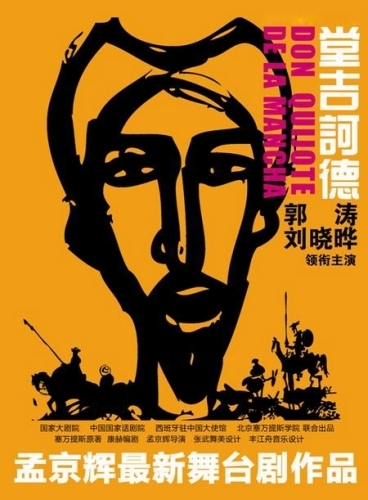Quixotic! Don Quixote in Shanghai
The dramatic theater of Spain made its way to Shanghai in July when a Spanish play, directed and performed by Chinese theater professionals, was performed onstage at the Shanghai Grand Theater. The play was put on in celebration of the Shanghai World Expo's Spain Pavilion.
|
|
The play was none other than the famed Don Quixote. This classic tale had already been performed in Beijing in 2009, but leading avant-garde theater director Meng Jinghui gave it a new spin with his unique style of humor.
Adopted from the original novel featuring the exploits of a Spanish knight obsessed with chivalry, Meng's version has more experimental elements, such as the introduction of elements from the Chinese legend Lady White Snake. Modern slang and jargon also made its way into Meng's reboot.
In order to better understand the story, Meng and his group of performers went to Spain to follow the same route that Don Quixote followed in the novel. "One day when I was standing on the beach, I suddenly felt as if I was having a conversation with the classic literature character from over 400 years ago," said Meng.
Meng said that Don Quixote's ideals and beliefs are similar to his own. "I wish I could be as crazy as Don Quixote," said Meng. "He is a combination of idealism and romanticism. Sometimes he acts like a naive child, but sometimes he appears to be a philosopher with deep thoughts." Meng's play is narrated in the same fashion as the original story, incorporating three of Don Quixote's surreal monologues.
Arguably China's most influential avant-garde director, Meng is a member of the National Theater Company of China, and is an active and popular figure in theatrical circles. Since the 1990s, he has stirred up a veritable storm of experimental drama in China with his continuous efforts in the field. Some of his most famous productions include Rhinoceros in Love, Two Dogs' View of Life, Accidental Death of An Anarchist and Waiting For Godot.
"The drama Don Quixote is the one I'm most proud of in recent years," said Meng. "I think the spirit of Don Quixote is very relevant to modern society, as almost everyone is chasing money and fame these days. I prefer to be a Don Quixote."
Although Meng has received some criticism for his unorthodox style, he said that he has already gotten used to it. Some audiences have said that some of his previous dramas are not easily understood. "But that is my style," said Meng. "It is impossible to please everyone, and I don't want to be too commercial."
Since the success of his play Rhinoceros in Love, Meng has renovated a gutted cinema into a proper theater. Meng's Fengchao Theater in Beijing was established in 2008. His original intention with this renovation was to create a venue where Rhinoceros in Love could be played many times annually; now, the theater is a haven for those that are passionate about experimental drama.
As for Don Quixote, Meng said that it is a play that he has wanted to direct for a long time. "Anyone who loves the arts and drama would fall for Don Quixote; and I believe that everyone, at a certain time in his or her life, has wished to be as fearless as Don Quixote, at least once," said Meng.
Actor Guo Tao plays Don Quixote in Meng's drama. The actor spent countless hours preparing for the role; he even changed his diet to make his portrayal as accurate as possible. Don Quixote was depicted as a thin man in the novel, so Guo switched to a diet of simple foods and vegetables that allowed him to lose 10 kilograms. He also cut his hair to fit the character and started to grow a beard.
Guo said that he admires Don Quixote's passionate quest to challenge the disparity and unfairness of life. "I want to give praise to his innocence and idealism," he explained.
Dramas Directed By Meng Jinghui
Rhinoceros in Love (1990)
The Bald Soprano (1991)
Waiting For Godot (1991)
Si Fan (1993)
The Balcony (1993)
I Love XXX (1994)
Twelfth Night (1996)
Accidental Death of an Anarchist (1999)
Bug (2000)
The Maze (2004)
Amber (2005)
The Magic Mountain (2006)
Two Dogs' View of Life (2009)
Murder in the Hanging Garden (2009)
The Love Story of Three Oranges (2010)
 0
0 








Go to Forum >>0 Comments